Critical Analysis of Ethical Practices in Asian Workplaces: Report
VerifiedAdded on 2022/09/07
|13
|3057
|96
Report
AI Summary
This report critically analyzes the challenges faced by organizational leaders in implementing ethical practices within Asian workplaces. It explores the complexities of cross-cultural business practices, corporate governance, and the impact of market competitiveness. The report highlights issues such as unethical practices, weak corporate governance, discrimination, and the influence of cultural fit in hiring processes. It examines the role of code of ethics, whistle-blowing policies, and ethics training in promoting ethical behavior. Furthermore, the report discusses the importance of sustainable practices, stakeholder engagement, and transparency in fostering a strong ethical culture. The analysis includes trends in corporate governance, the effectiveness of different ethical strategies, and the significance of ethical commitment in gaining a competitive advantage and ensuring stakeholder satisfaction. The report concludes by emphasizing the need for increased awareness, monitoring, and commitment to ethical practices to overcome the challenges faced by managers in Asian workplaces.
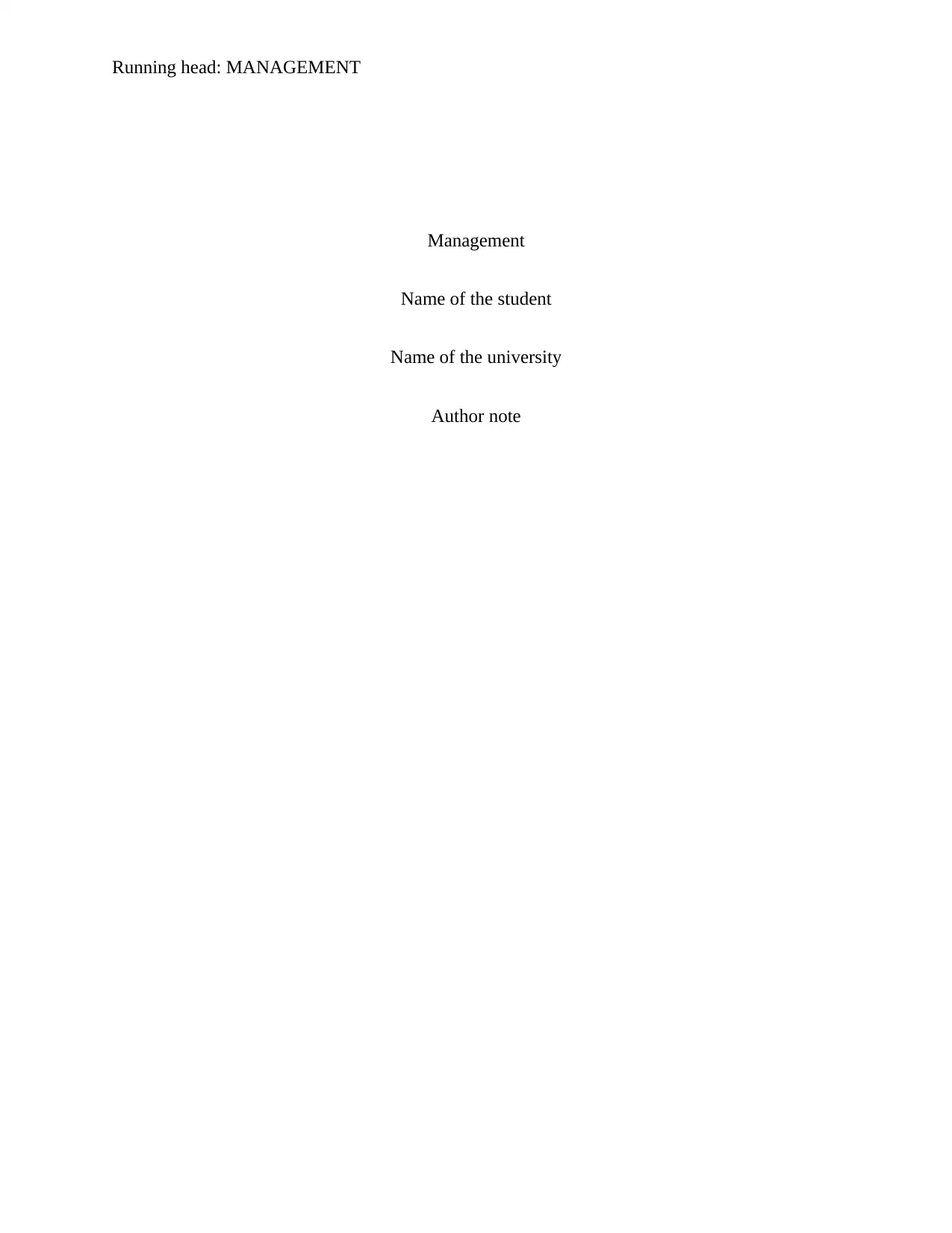
Running head: MANAGEMENT
Management
Name of the student
Name of the university
Author note
Management
Name of the student
Name of the university
Author note
Paraphrase This Document
Need a fresh take? Get an instant paraphrase of this document with our AI Paraphraser
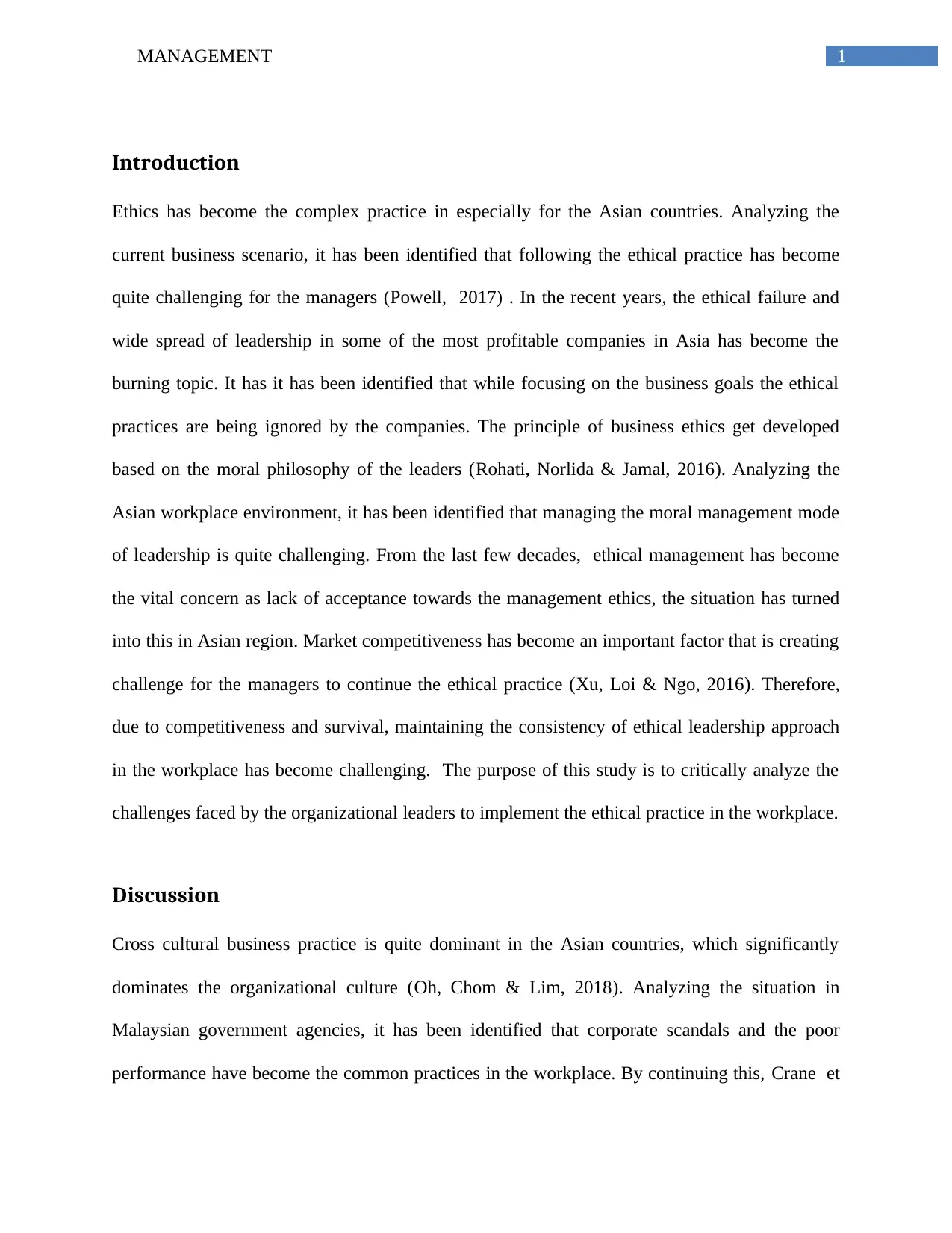
1MANAGEMENT
Introduction
Ethics has become the complex practice in especially for the Asian countries. Analyzing the
current business scenario, it has been identified that following the ethical practice has become
quite challenging for the managers (Powell, 2017) . In the recent years, the ethical failure and
wide spread of leadership in some of the most profitable companies in Asia has become the
burning topic. It has it has been identified that while focusing on the business goals the ethical
practices are being ignored by the companies. The principle of business ethics get developed
based on the moral philosophy of the leaders (Rohati, Norlida & Jamal, 2016). Analyzing the
Asian workplace environment, it has been identified that managing the moral management mode
of leadership is quite challenging. From the last few decades, ethical management has become
the vital concern as lack of acceptance towards the management ethics, the situation has turned
into this in Asian region. Market competitiveness has become an important factor that is creating
challenge for the managers to continue the ethical practice (Xu, Loi & Ngo, 2016). Therefore,
due to competitiveness and survival, maintaining the consistency of ethical leadership approach
in the workplace has become challenging. The purpose of this study is to critically analyze the
challenges faced by the organizational leaders to implement the ethical practice in the workplace.
Discussion
Cross cultural business practice is quite dominant in the Asian countries, which significantly
dominates the organizational culture (Oh, Chom & Lim, 2018). Analyzing the situation in
Malaysian government agencies, it has been identified that corporate scandals and the poor
performance have become the common practices in the workplace. By continuing this, Crane et
Introduction
Ethics has become the complex practice in especially for the Asian countries. Analyzing the
current business scenario, it has been identified that following the ethical practice has become
quite challenging for the managers (Powell, 2017) . In the recent years, the ethical failure and
wide spread of leadership in some of the most profitable companies in Asia has become the
burning topic. It has it has been identified that while focusing on the business goals the ethical
practices are being ignored by the companies. The principle of business ethics get developed
based on the moral philosophy of the leaders (Rohati, Norlida & Jamal, 2016). Analyzing the
Asian workplace environment, it has been identified that managing the moral management mode
of leadership is quite challenging. From the last few decades, ethical management has become
the vital concern as lack of acceptance towards the management ethics, the situation has turned
into this in Asian region. Market competitiveness has become an important factor that is creating
challenge for the managers to continue the ethical practice (Xu, Loi & Ngo, 2016). Therefore,
due to competitiveness and survival, maintaining the consistency of ethical leadership approach
in the workplace has become challenging. The purpose of this study is to critically analyze the
challenges faced by the organizational leaders to implement the ethical practice in the workplace.
Discussion
Cross cultural business practice is quite dominant in the Asian countries, which significantly
dominates the organizational culture (Oh, Chom & Lim, 2018). Analyzing the situation in
Malaysian government agencies, it has been identified that corporate scandals and the poor
performance have become the common practices in the workplace. By continuing this, Crane et
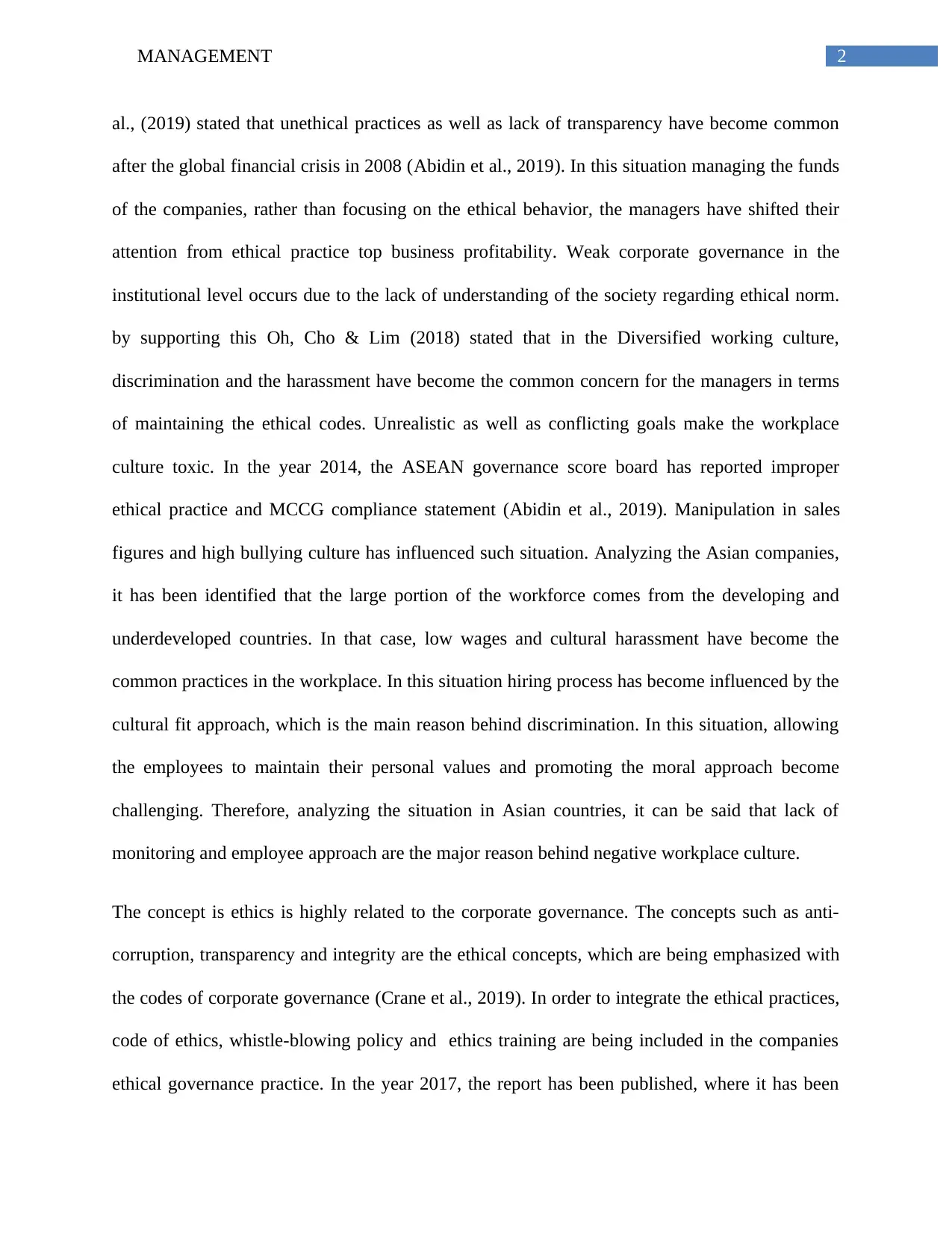
2MANAGEMENT
al., (2019) stated that unethical practices as well as lack of transparency have become common
after the global financial crisis in 2008 (Abidin et al., 2019). In this situation managing the funds
of the companies, rather than focusing on the ethical behavior, the managers have shifted their
attention from ethical practice top business profitability. Weak corporate governance in the
institutional level occurs due to the lack of understanding of the society regarding ethical norm.
by supporting this Oh, Cho & Lim (2018) stated that in the Diversified working culture,
discrimination and the harassment have become the common concern for the managers in terms
of maintaining the ethical codes. Unrealistic as well as conflicting goals make the workplace
culture toxic. In the year 2014, the ASEAN governance score board has reported improper
ethical practice and MCCG compliance statement (Abidin et al., 2019). Manipulation in sales
figures and high bullying culture has influenced such situation. Analyzing the Asian companies,
it has been identified that the large portion of the workforce comes from the developing and
underdeveloped countries. In that case, low wages and cultural harassment have become the
common practices in the workplace. In this situation hiring process has become influenced by the
cultural fit approach, which is the main reason behind discrimination. In this situation, allowing
the employees to maintain their personal values and promoting the moral approach become
challenging. Therefore, analyzing the situation in Asian countries, it can be said that lack of
monitoring and employee approach are the major reason behind negative workplace culture.
The concept is ethics is highly related to the corporate governance. The concepts such as anti-
corruption, transparency and integrity are the ethical concepts, which are being emphasized with
the codes of corporate governance (Crane et al., 2019). In order to integrate the ethical practices,
code of ethics, whistle-blowing policy and ethics training are being included in the companies
ethical governance practice. In the year 2017, the report has been published, where it has been
al., (2019) stated that unethical practices as well as lack of transparency have become common
after the global financial crisis in 2008 (Abidin et al., 2019). In this situation managing the funds
of the companies, rather than focusing on the ethical behavior, the managers have shifted their
attention from ethical practice top business profitability. Weak corporate governance in the
institutional level occurs due to the lack of understanding of the society regarding ethical norm.
by supporting this Oh, Cho & Lim (2018) stated that in the Diversified working culture,
discrimination and the harassment have become the common concern for the managers in terms
of maintaining the ethical codes. Unrealistic as well as conflicting goals make the workplace
culture toxic. In the year 2014, the ASEAN governance score board has reported improper
ethical practice and MCCG compliance statement (Abidin et al., 2019). Manipulation in sales
figures and high bullying culture has influenced such situation. Analyzing the Asian companies,
it has been identified that the large portion of the workforce comes from the developing and
underdeveloped countries. In that case, low wages and cultural harassment have become the
common practices in the workplace. In this situation hiring process has become influenced by the
cultural fit approach, which is the main reason behind discrimination. In this situation, allowing
the employees to maintain their personal values and promoting the moral approach become
challenging. Therefore, analyzing the situation in Asian countries, it can be said that lack of
monitoring and employee approach are the major reason behind negative workplace culture.
The concept is ethics is highly related to the corporate governance. The concepts such as anti-
corruption, transparency and integrity are the ethical concepts, which are being emphasized with
the codes of corporate governance (Crane et al., 2019). In order to integrate the ethical practices,
code of ethics, whistle-blowing policy and ethics training are being included in the companies
ethical governance practice. In the year 2017, the report has been published, where it has been
⊘ This is a preview!⊘
Do you want full access?
Subscribe today to unlock all pages.

Trusted by 1+ million students worldwide
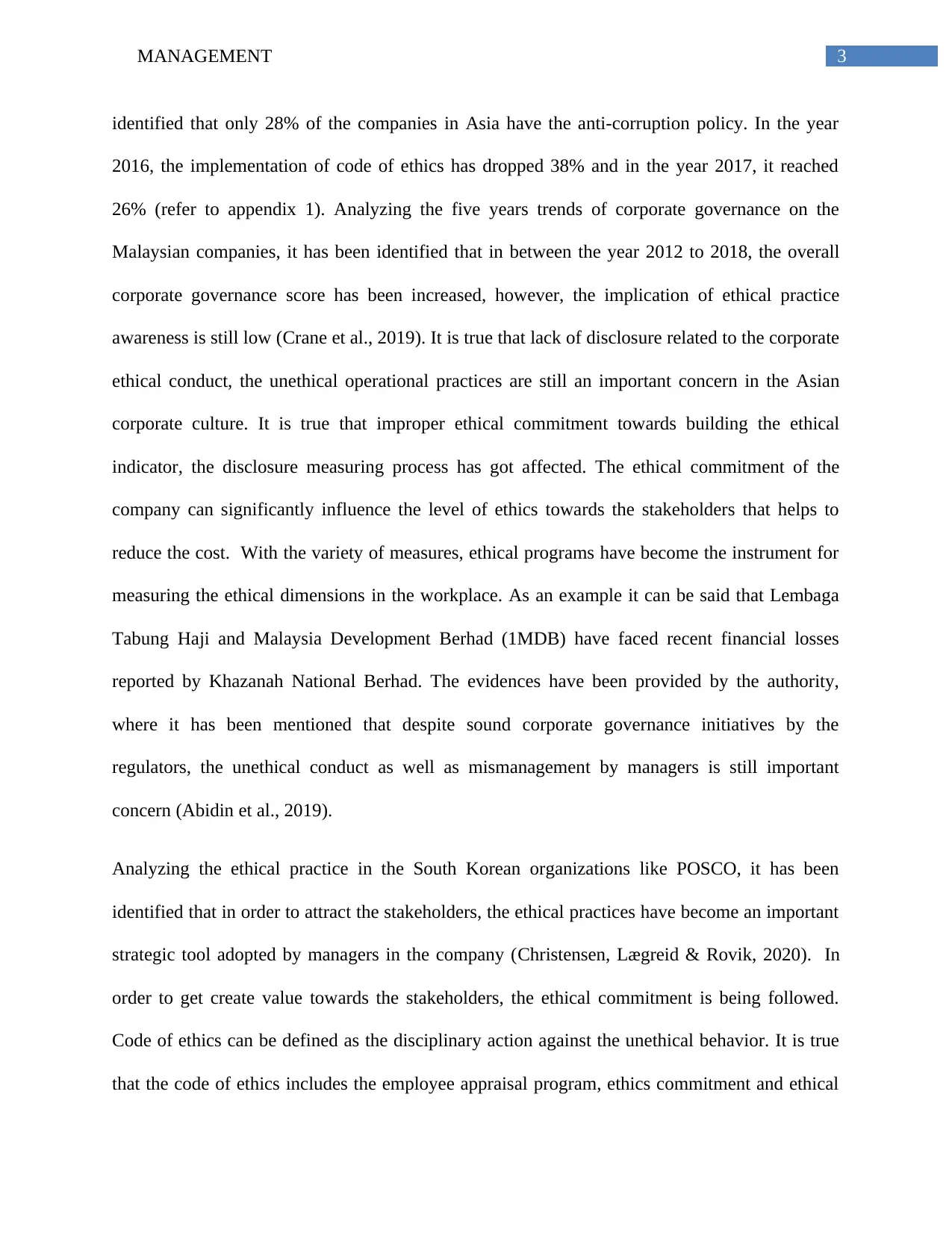
3MANAGEMENT
identified that only 28% of the companies in Asia have the anti-corruption policy. In the year
2016, the implementation of code of ethics has dropped 38% and in the year 2017, it reached
26% (refer to appendix 1). Analyzing the five years trends of corporate governance on the
Malaysian companies, it has been identified that in between the year 2012 to 2018, the overall
corporate governance score has been increased, however, the implication of ethical practice
awareness is still low (Crane et al., 2019). It is true that lack of disclosure related to the corporate
ethical conduct, the unethical operational practices are still an important concern in the Asian
corporate culture. It is true that improper ethical commitment towards building the ethical
indicator, the disclosure measuring process has got affected. The ethical commitment of the
company can significantly influence the level of ethics towards the stakeholders that helps to
reduce the cost. With the variety of measures, ethical programs have become the instrument for
measuring the ethical dimensions in the workplace. As an example it can be said that Lembaga
Tabung Haji and Malaysia Development Berhad (1MDB) have faced recent financial losses
reported by Khazanah National Berhad. The evidences have been provided by the authority,
where it has been mentioned that despite sound corporate governance initiatives by the
regulators, the unethical conduct as well as mismanagement by managers is still important
concern (Abidin et al., 2019).
Analyzing the ethical practice in the South Korean organizations like POSCO, it has been
identified that in order to attract the stakeholders, the ethical practices have become an important
strategic tool adopted by managers in the company (Christensen, Lægreid & Rovik, 2020). In
order to get create value towards the stakeholders, the ethical commitment is being followed.
Code of ethics can be defined as the disciplinary action against the unethical behavior. It is true
that the code of ethics includes the employee appraisal program, ethics commitment and ethical
identified that only 28% of the companies in Asia have the anti-corruption policy. In the year
2016, the implementation of code of ethics has dropped 38% and in the year 2017, it reached
26% (refer to appendix 1). Analyzing the five years trends of corporate governance on the
Malaysian companies, it has been identified that in between the year 2012 to 2018, the overall
corporate governance score has been increased, however, the implication of ethical practice
awareness is still low (Crane et al., 2019). It is true that lack of disclosure related to the corporate
ethical conduct, the unethical operational practices are still an important concern in the Asian
corporate culture. It is true that improper ethical commitment towards building the ethical
indicator, the disclosure measuring process has got affected. The ethical commitment of the
company can significantly influence the level of ethics towards the stakeholders that helps to
reduce the cost. With the variety of measures, ethical programs have become the instrument for
measuring the ethical dimensions in the workplace. As an example it can be said that Lembaga
Tabung Haji and Malaysia Development Berhad (1MDB) have faced recent financial losses
reported by Khazanah National Berhad. The evidences have been provided by the authority,
where it has been mentioned that despite sound corporate governance initiatives by the
regulators, the unethical conduct as well as mismanagement by managers is still important
concern (Abidin et al., 2019).
Analyzing the ethical practice in the South Korean organizations like POSCO, it has been
identified that in order to attract the stakeholders, the ethical practices have become an important
strategic tool adopted by managers in the company (Christensen, Lægreid & Rovik, 2020). In
order to get create value towards the stakeholders, the ethical commitment is being followed.
Code of ethics can be defined as the disciplinary action against the unethical behavior. It is true
that the code of ethics includes the employee appraisal program, ethics commitment and ethical
Paraphrase This Document
Need a fresh take? Get an instant paraphrase of this document with our AI Paraphraser
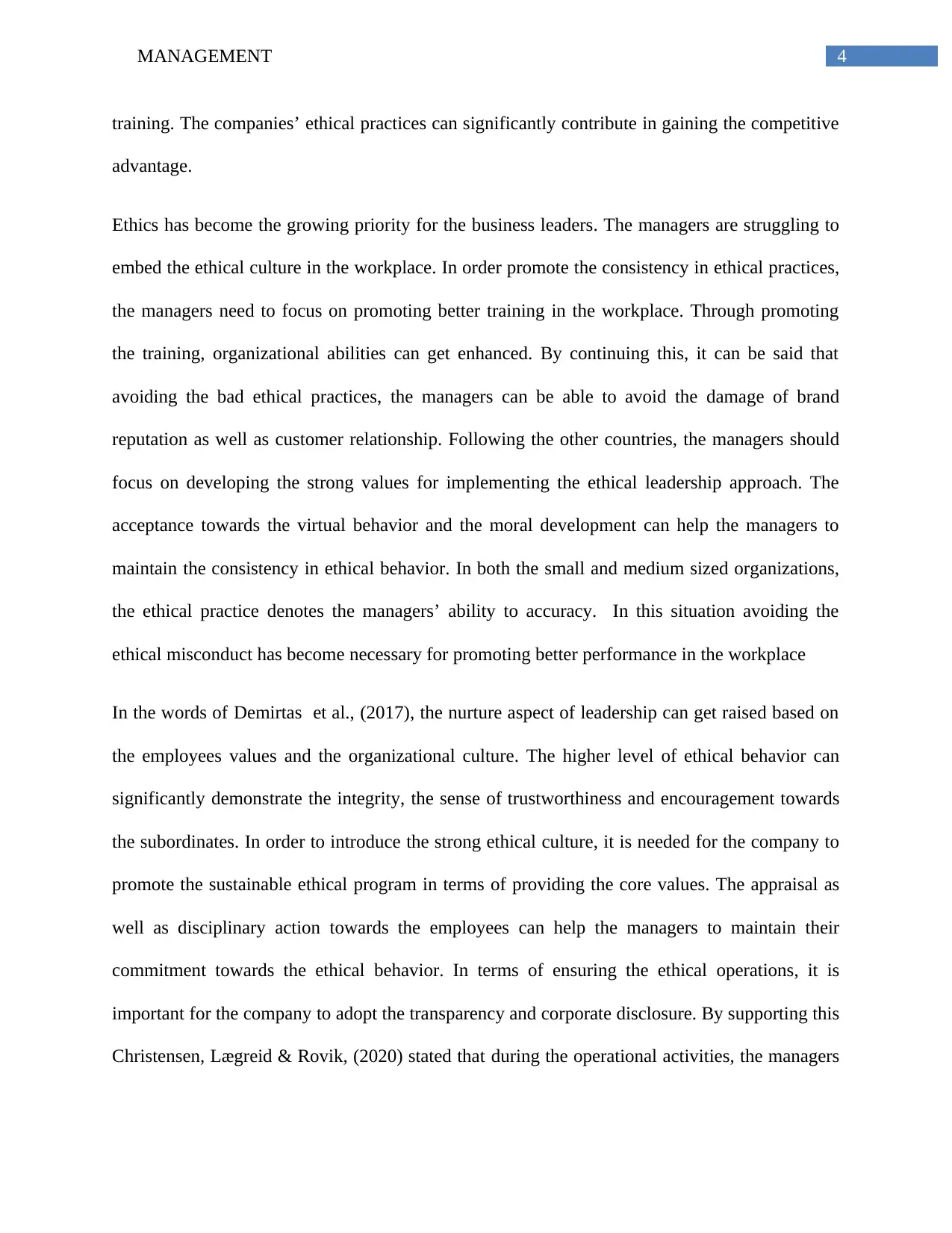
4MANAGEMENT
training. The companies’ ethical practices can significantly contribute in gaining the competitive
advantage.
Ethics has become the growing priority for the business leaders. The managers are struggling to
embed the ethical culture in the workplace. In order promote the consistency in ethical practices,
the managers need to focus on promoting better training in the workplace. Through promoting
the training, organizational abilities can get enhanced. By continuing this, it can be said that
avoiding the bad ethical practices, the managers can be able to avoid the damage of brand
reputation as well as customer relationship. Following the other countries, the managers should
focus on developing the strong values for implementing the ethical leadership approach. The
acceptance towards the virtual behavior and the moral development can help the managers to
maintain the consistency in ethical behavior. In both the small and medium sized organizations,
the ethical practice denotes the managers’ ability to accuracy. In this situation avoiding the
ethical misconduct has become necessary for promoting better performance in the workplace
In the words of Demirtas et al., (2017), the nurture aspect of leadership can get raised based on
the employees values and the organizational culture. The higher level of ethical behavior can
significantly demonstrate the integrity, the sense of trustworthiness and encouragement towards
the subordinates. In order to introduce the strong ethical culture, it is needed for the company to
promote the sustainable ethical program in terms of providing the core values. The appraisal as
well as disciplinary action towards the employees can help the managers to maintain their
commitment towards the ethical behavior. In terms of ensuring the ethical operations, it is
important for the company to adopt the transparency and corporate disclosure. By supporting this
Christensen, Lægreid & Rovik, (2020) stated that during the operational activities, the managers
training. The companies’ ethical practices can significantly contribute in gaining the competitive
advantage.
Ethics has become the growing priority for the business leaders. The managers are struggling to
embed the ethical culture in the workplace. In order promote the consistency in ethical practices,
the managers need to focus on promoting better training in the workplace. Through promoting
the training, organizational abilities can get enhanced. By continuing this, it can be said that
avoiding the bad ethical practices, the managers can be able to avoid the damage of brand
reputation as well as customer relationship. Following the other countries, the managers should
focus on developing the strong values for implementing the ethical leadership approach. The
acceptance towards the virtual behavior and the moral development can help the managers to
maintain the consistency in ethical behavior. In both the small and medium sized organizations,
the ethical practice denotes the managers’ ability to accuracy. In this situation avoiding the
ethical misconduct has become necessary for promoting better performance in the workplace
In the words of Demirtas et al., (2017), the nurture aspect of leadership can get raised based on
the employees values and the organizational culture. The higher level of ethical behavior can
significantly demonstrate the integrity, the sense of trustworthiness and encouragement towards
the subordinates. In order to introduce the strong ethical culture, it is needed for the company to
promote the sustainable ethical program in terms of providing the core values. The appraisal as
well as disciplinary action towards the employees can help the managers to maintain their
commitment towards the ethical behavior. In terms of ensuring the ethical operations, it is
important for the company to adopt the transparency and corporate disclosure. By supporting this
Christensen, Lægreid & Rovik, (2020) stated that during the operational activities, the managers
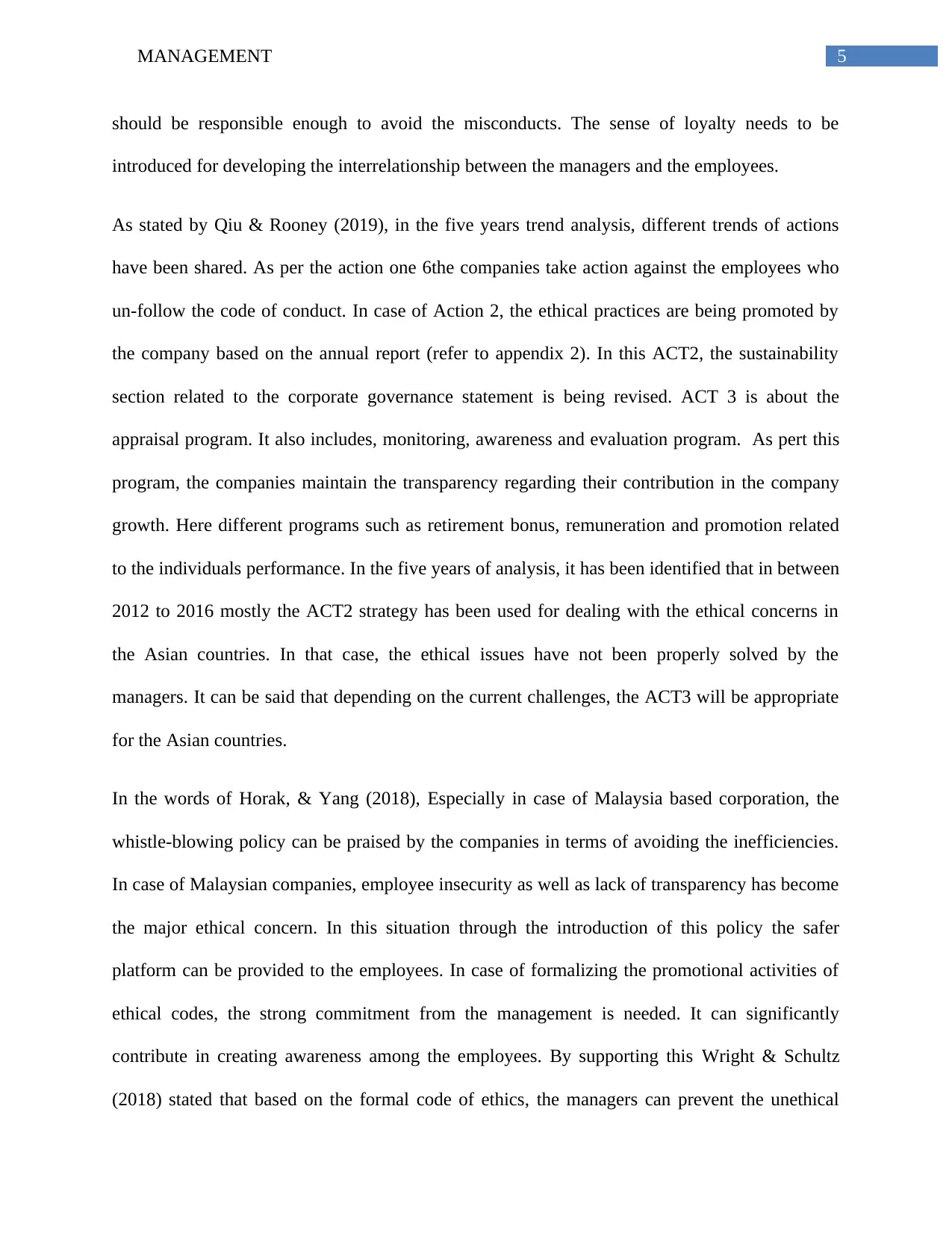
5MANAGEMENT
should be responsible enough to avoid the misconducts. The sense of loyalty needs to be
introduced for developing the interrelationship between the managers and the employees.
As stated by Qiu & Rooney (2019), in the five years trend analysis, different trends of actions
have been shared. As per the action one 6the companies take action against the employees who
un-follow the code of conduct. In case of Action 2, the ethical practices are being promoted by
the company based on the annual report (refer to appendix 2). In this ACT2, the sustainability
section related to the corporate governance statement is being revised. ACT 3 is about the
appraisal program. It also includes, monitoring, awareness and evaluation program. As pert this
program, the companies maintain the transparency regarding their contribution in the company
growth. Here different programs such as retirement bonus, remuneration and promotion related
to the individuals performance. In the five years of analysis, it has been identified that in between
2012 to 2016 mostly the ACT2 strategy has been used for dealing with the ethical concerns in
the Asian countries. In that case, the ethical issues have not been properly solved by the
managers. It can be said that depending on the current challenges, the ACT3 will be appropriate
for the Asian countries.
In the words of Horak, & Yang (2018), Especially in case of Malaysia based corporation, the
whistle-blowing policy can be praised by the companies in terms of avoiding the inefficiencies.
In case of Malaysian companies, employee insecurity as well as lack of transparency has become
the major ethical concern. In this situation through the introduction of this policy the safer
platform can be provided to the employees. In case of formalizing the promotional activities of
ethical codes, the strong commitment from the management is needed. It can significantly
contribute in creating awareness among the employees. By supporting this Wright & Schultz
(2018) stated that based on the formal code of ethics, the managers can prevent the unethical
should be responsible enough to avoid the misconducts. The sense of loyalty needs to be
introduced for developing the interrelationship between the managers and the employees.
As stated by Qiu & Rooney (2019), in the five years trend analysis, different trends of actions
have been shared. As per the action one 6the companies take action against the employees who
un-follow the code of conduct. In case of Action 2, the ethical practices are being promoted by
the company based on the annual report (refer to appendix 2). In this ACT2, the sustainability
section related to the corporate governance statement is being revised. ACT 3 is about the
appraisal program. It also includes, monitoring, awareness and evaluation program. As pert this
program, the companies maintain the transparency regarding their contribution in the company
growth. Here different programs such as retirement bonus, remuneration and promotion related
to the individuals performance. In the five years of analysis, it has been identified that in between
2012 to 2016 mostly the ACT2 strategy has been used for dealing with the ethical concerns in
the Asian countries. In that case, the ethical issues have not been properly solved by the
managers. It can be said that depending on the current challenges, the ACT3 will be appropriate
for the Asian countries.
In the words of Horak, & Yang (2018), Especially in case of Malaysia based corporation, the
whistle-blowing policy can be praised by the companies in terms of avoiding the inefficiencies.
In case of Malaysian companies, employee insecurity as well as lack of transparency has become
the major ethical concern. In this situation through the introduction of this policy the safer
platform can be provided to the employees. In case of formalizing the promotional activities of
ethical codes, the strong commitment from the management is needed. It can significantly
contribute in creating awareness among the employees. By supporting this Wright & Schultz
(2018) stated that based on the formal code of ethics, the managers can prevent the unethical
⊘ This is a preview!⊘
Do you want full access?
Subscribe today to unlock all pages.

Trusted by 1+ million students worldwide
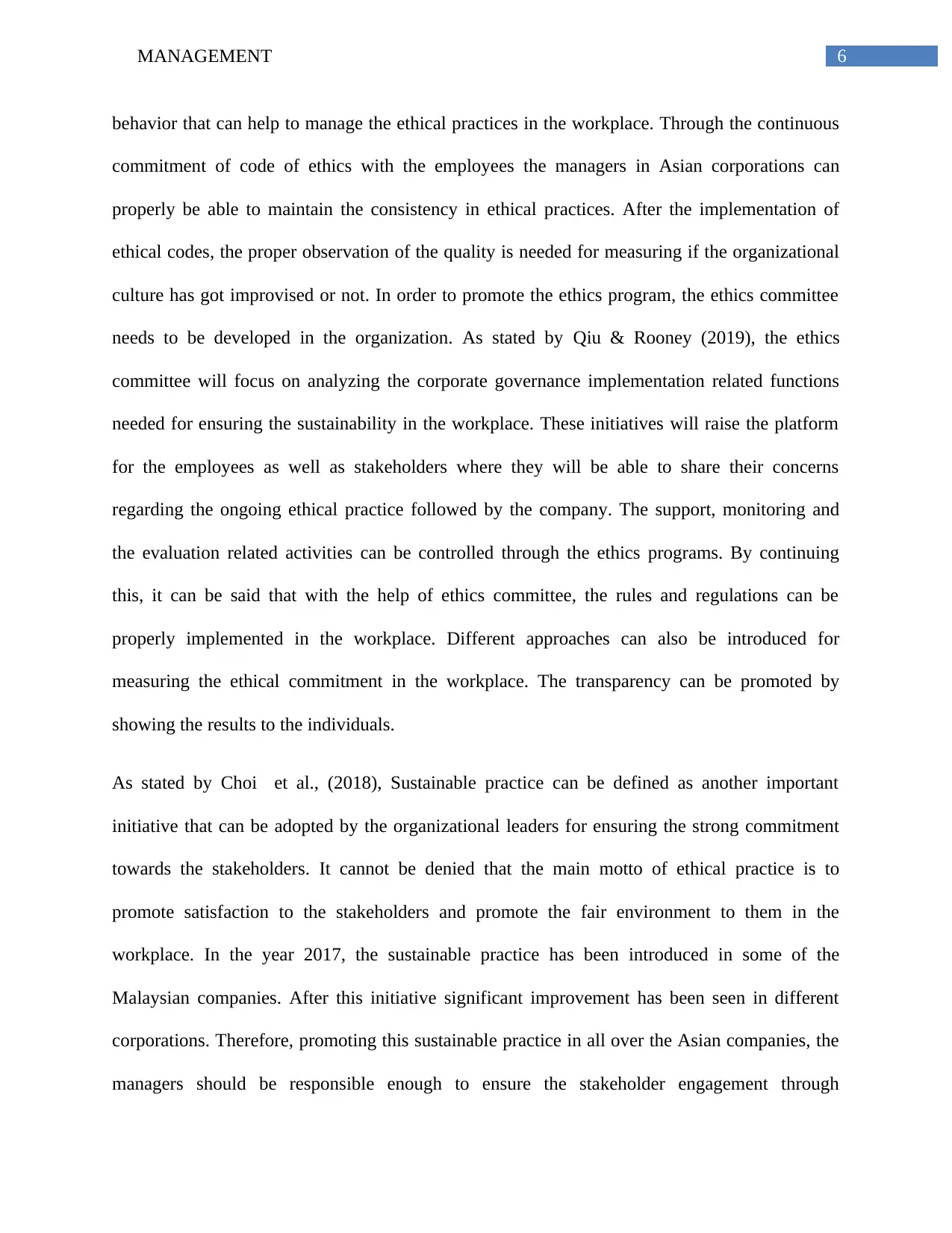
6MANAGEMENT
behavior that can help to manage the ethical practices in the workplace. Through the continuous
commitment of code of ethics with the employees the managers in Asian corporations can
properly be able to maintain the consistency in ethical practices. After the implementation of
ethical codes, the proper observation of the quality is needed for measuring if the organizational
culture has got improvised or not. In order to promote the ethics program, the ethics committee
needs to be developed in the organization. As stated by Qiu & Rooney (2019), the ethics
committee will focus on analyzing the corporate governance implementation related functions
needed for ensuring the sustainability in the workplace. These initiatives will raise the platform
for the employees as well as stakeholders where they will be able to share their concerns
regarding the ongoing ethical practice followed by the company. The support, monitoring and
the evaluation related activities can be controlled through the ethics programs. By continuing
this, it can be said that with the help of ethics committee, the rules and regulations can be
properly implemented in the workplace. Different approaches can also be introduced for
measuring the ethical commitment in the workplace. The transparency can be promoted by
showing the results to the individuals.
As stated by Choi et al., (2018), Sustainable practice can be defined as another important
initiative that can be adopted by the organizational leaders for ensuring the strong commitment
towards the stakeholders. It cannot be denied that the main motto of ethical practice is to
promote satisfaction to the stakeholders and promote the fair environment to them in the
workplace. In the year 2017, the sustainable practice has been introduced in some of the
Malaysian companies. After this initiative significant improvement has been seen in different
corporations. Therefore, promoting this sustainable practice in all over the Asian companies, the
managers should be responsible enough to ensure the stakeholder engagement through
behavior that can help to manage the ethical practices in the workplace. Through the continuous
commitment of code of ethics with the employees the managers in Asian corporations can
properly be able to maintain the consistency in ethical practices. After the implementation of
ethical codes, the proper observation of the quality is needed for measuring if the organizational
culture has got improvised or not. In order to promote the ethics program, the ethics committee
needs to be developed in the organization. As stated by Qiu & Rooney (2019), the ethics
committee will focus on analyzing the corporate governance implementation related functions
needed for ensuring the sustainability in the workplace. These initiatives will raise the platform
for the employees as well as stakeholders where they will be able to share their concerns
regarding the ongoing ethical practice followed by the company. The support, monitoring and
the evaluation related activities can be controlled through the ethics programs. By continuing
this, it can be said that with the help of ethics committee, the rules and regulations can be
properly implemented in the workplace. Different approaches can also be introduced for
measuring the ethical commitment in the workplace. The transparency can be promoted by
showing the results to the individuals.
As stated by Choi et al., (2018), Sustainable practice can be defined as another important
initiative that can be adopted by the organizational leaders for ensuring the strong commitment
towards the stakeholders. It cannot be denied that the main motto of ethical practice is to
promote satisfaction to the stakeholders and promote the fair environment to them in the
workplace. In the year 2017, the sustainable practice has been introduced in some of the
Malaysian companies. After this initiative significant improvement has been seen in different
corporations. Therefore, promoting this sustainable practice in all over the Asian companies, the
managers should be responsible enough to ensure the stakeholder engagement through
Paraphrase This Document
Need a fresh take? Get an instant paraphrase of this document with our AI Paraphraser
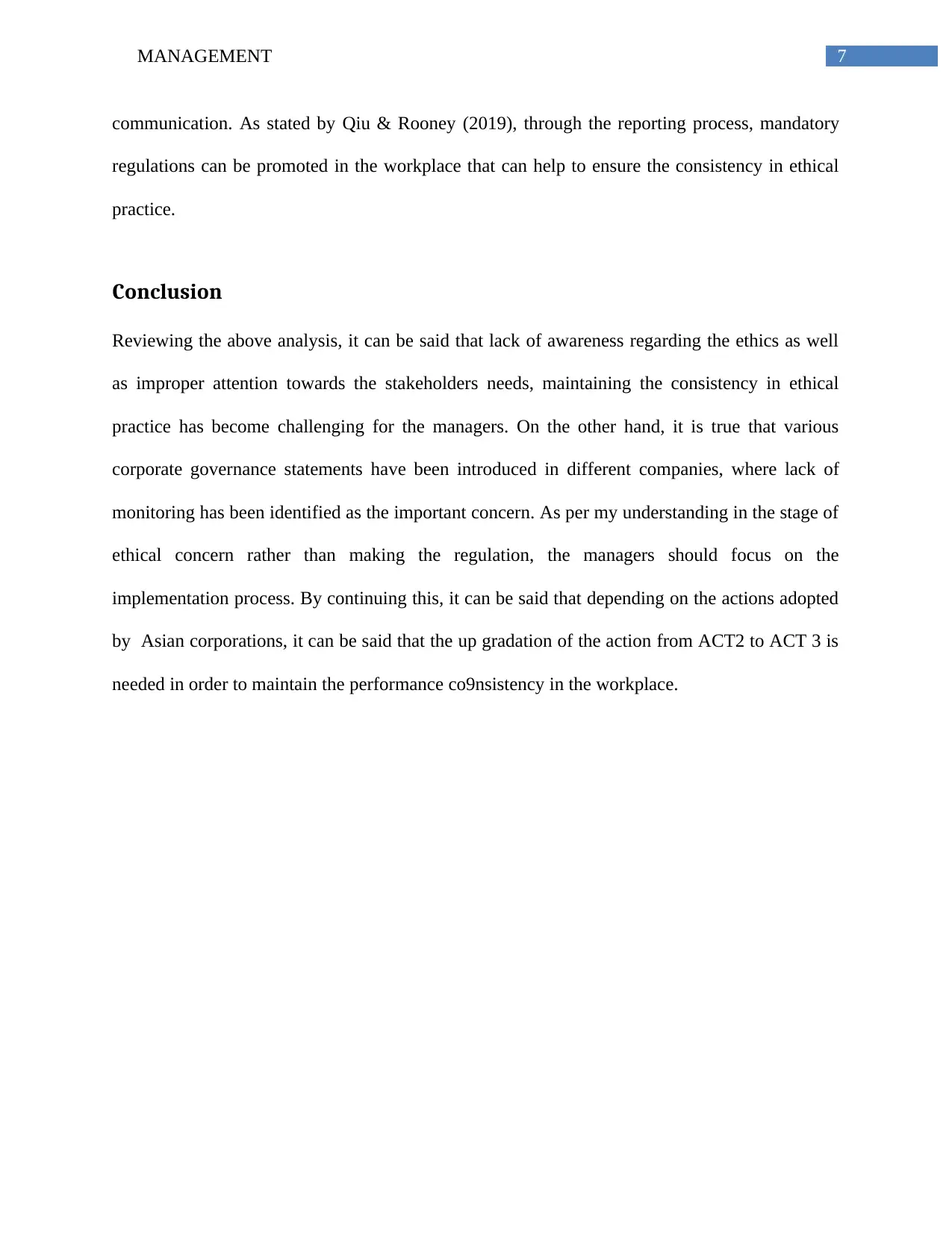
7MANAGEMENT
communication. As stated by Qiu & Rooney (2019), through the reporting process, mandatory
regulations can be promoted in the workplace that can help to ensure the consistency in ethical
practice.
Conclusion
Reviewing the above analysis, it can be said that lack of awareness regarding the ethics as well
as improper attention towards the stakeholders needs, maintaining the consistency in ethical
practice has become challenging for the managers. On the other hand, it is true that various
corporate governance statements have been introduced in different companies, where lack of
monitoring has been identified as the important concern. As per my understanding in the stage of
ethical concern rather than making the regulation, the managers should focus on the
implementation process. By continuing this, it can be said that depending on the actions adopted
by Asian corporations, it can be said that the up gradation of the action from ACT2 to ACT 3 is
needed in order to maintain the performance co9nsistency in the workplace.
communication. As stated by Qiu & Rooney (2019), through the reporting process, mandatory
regulations can be promoted in the workplace that can help to ensure the consistency in ethical
practice.
Conclusion
Reviewing the above analysis, it can be said that lack of awareness regarding the ethics as well
as improper attention towards the stakeholders needs, maintaining the consistency in ethical
practice has become challenging for the managers. On the other hand, it is true that various
corporate governance statements have been introduced in different companies, where lack of
monitoring has been identified as the important concern. As per my understanding in the stage of
ethical concern rather than making the regulation, the managers should focus on the
implementation process. By continuing this, it can be said that depending on the actions adopted
by Asian corporations, it can be said that the up gradation of the action from ACT2 to ACT 3 is
needed in order to maintain the performance co9nsistency in the workplace.
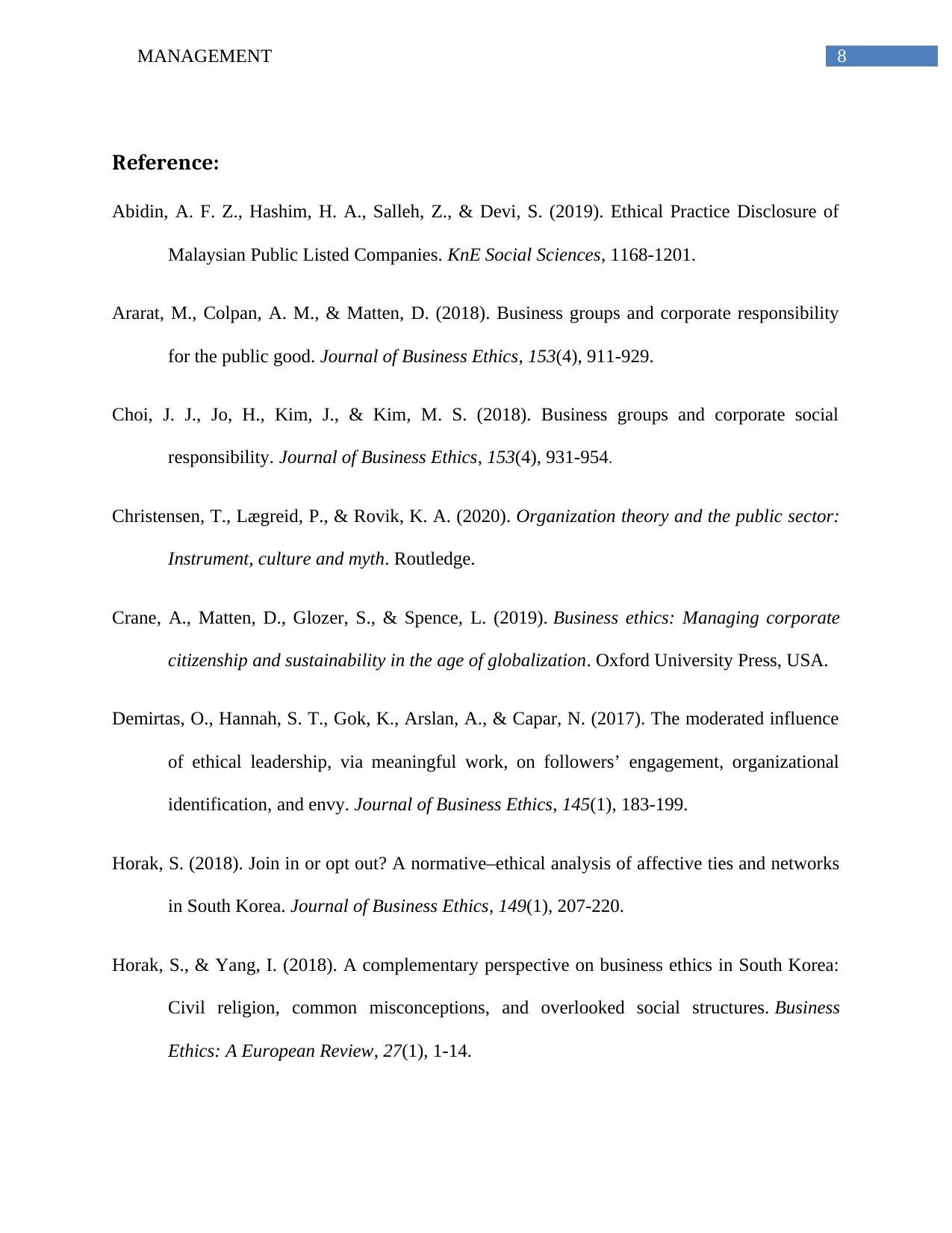
8MANAGEMENT
Reference:
Abidin, A. F. Z., Hashim, H. A., Salleh, Z., & Devi, S. (2019). Ethical Practice Disclosure of
Malaysian Public Listed Companies. KnE Social Sciences, 1168-1201.
Ararat, M., Colpan, A. M., & Matten, D. (2018). Business groups and corporate responsibility
for the public good. Journal of Business Ethics, 153(4), 911-929.
Choi, J. J., Jo, H., Kim, J., & Kim, M. S. (2018). Business groups and corporate social
responsibility. Journal of Business Ethics, 153(4), 931-954.
Christensen, T., Lægreid, P., & Rovik, K. A. (2020). Organization theory and the public sector:
Instrument, culture and myth. Routledge.
Crane, A., Matten, D., Glozer, S., & Spence, L. (2019). Business ethics: Managing corporate
citizenship and sustainability in the age of globalization. Oxford University Press, USA.
Demirtas, O., Hannah, S. T., Gok, K., Arslan, A., & Capar, N. (2017). The moderated influence
of ethical leadership, via meaningful work, on followers’ engagement, organizational
identification, and envy. Journal of Business Ethics, 145(1), 183-199.
Horak, S. (2018). Join in or opt out? A normative–ethical analysis of affective ties and networks
in South Korea. Journal of Business Ethics, 149(1), 207-220.
Horak, S., & Yang, I. (2018). A complementary perspective on business ethics in South Korea:
Civil religion, common misconceptions, and overlooked social structures. Business
Ethics: A European Review, 27(1), 1-14.
Reference:
Abidin, A. F. Z., Hashim, H. A., Salleh, Z., & Devi, S. (2019). Ethical Practice Disclosure of
Malaysian Public Listed Companies. KnE Social Sciences, 1168-1201.
Ararat, M., Colpan, A. M., & Matten, D. (2018). Business groups and corporate responsibility
for the public good. Journal of Business Ethics, 153(4), 911-929.
Choi, J. J., Jo, H., Kim, J., & Kim, M. S. (2018). Business groups and corporate social
responsibility. Journal of Business Ethics, 153(4), 931-954.
Christensen, T., Lægreid, P., & Rovik, K. A. (2020). Organization theory and the public sector:
Instrument, culture and myth. Routledge.
Crane, A., Matten, D., Glozer, S., & Spence, L. (2019). Business ethics: Managing corporate
citizenship and sustainability in the age of globalization. Oxford University Press, USA.
Demirtas, O., Hannah, S. T., Gok, K., Arslan, A., & Capar, N. (2017). The moderated influence
of ethical leadership, via meaningful work, on followers’ engagement, organizational
identification, and envy. Journal of Business Ethics, 145(1), 183-199.
Horak, S. (2018). Join in or opt out? A normative–ethical analysis of affective ties and networks
in South Korea. Journal of Business Ethics, 149(1), 207-220.
Horak, S., & Yang, I. (2018). A complementary perspective on business ethics in South Korea:
Civil religion, common misconceptions, and overlooked social structures. Business
Ethics: A European Review, 27(1), 1-14.
⊘ This is a preview!⊘
Do you want full access?
Subscribe today to unlock all pages.

Trusted by 1+ million students worldwide
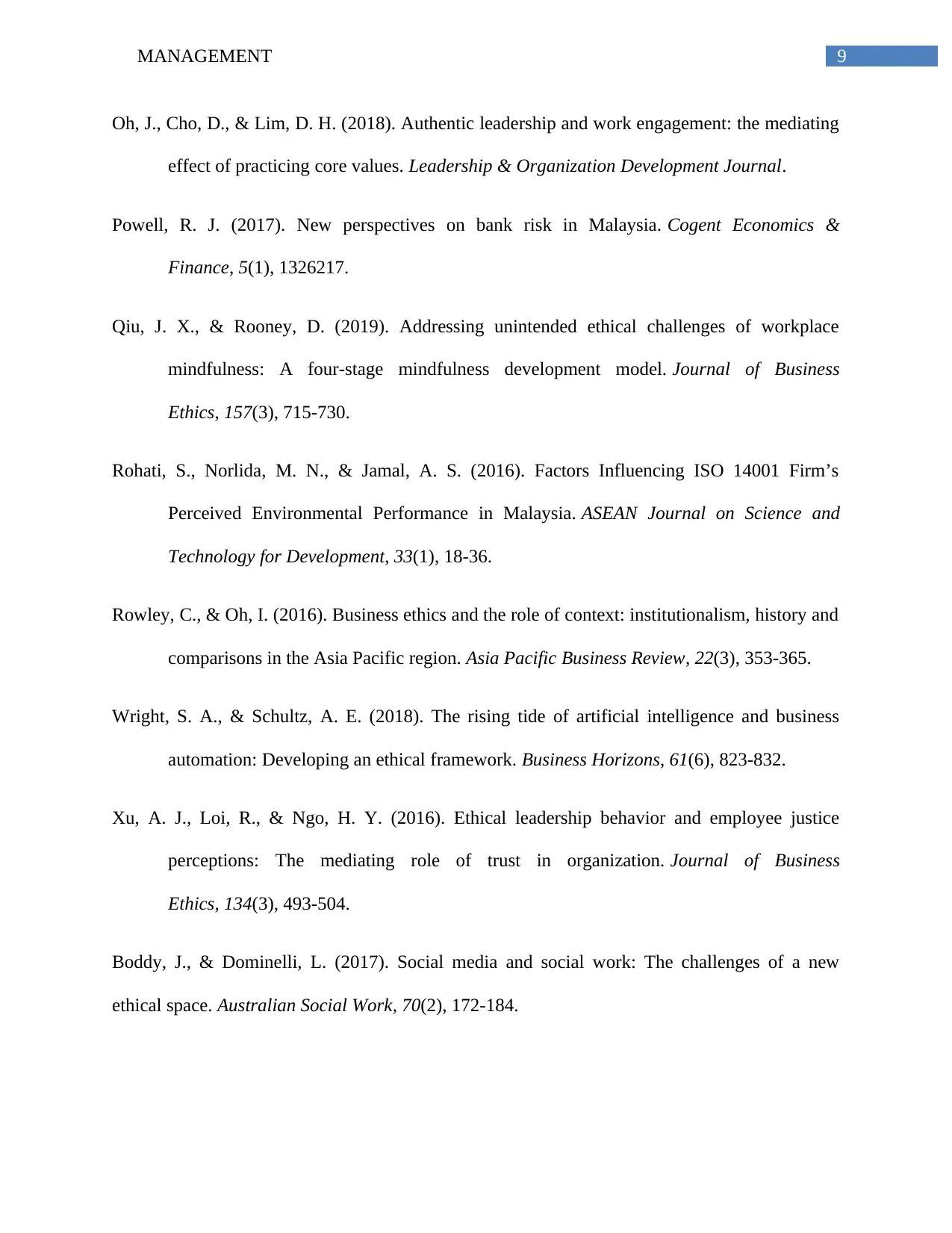
9MANAGEMENT
Oh, J., Cho, D., & Lim, D. H. (2018). Authentic leadership and work engagement: the mediating
effect of practicing core values. Leadership & Organization Development Journal.
Powell, R. J. (2017). New perspectives on bank risk in Malaysia. Cogent Economics &
Finance, 5(1), 1326217.
Qiu, J. X., & Rooney, D. (2019). Addressing unintended ethical challenges of workplace
mindfulness: A four-stage mindfulness development model. Journal of Business
Ethics, 157(3), 715-730.
Rohati, S., Norlida, M. N., & Jamal, A. S. (2016). Factors Influencing ISO 14001 Firm’s
Perceived Environmental Performance in Malaysia. ASEAN Journal on Science and
Technology for Development, 33(1), 18-36.
Rowley, C., & Oh, I. (2016). Business ethics and the role of context: institutionalism, history and
comparisons in the Asia Pacific region. Asia Pacific Business Review, 22(3), 353-365.
Wright, S. A., & Schultz, A. E. (2018). The rising tide of artificial intelligence and business
automation: Developing an ethical framework. Business Horizons, 61(6), 823-832.
Xu, A. J., Loi, R., & Ngo, H. Y. (2016). Ethical leadership behavior and employee justice
perceptions: The mediating role of trust in organization. Journal of Business
Ethics, 134(3), 493-504.
Boddy, J., & Dominelli, L. (2017). Social media and social work: The challenges of a new
ethical space. Australian Social Work, 70(2), 172-184.
Oh, J., Cho, D., & Lim, D. H. (2018). Authentic leadership and work engagement: the mediating
effect of practicing core values. Leadership & Organization Development Journal.
Powell, R. J. (2017). New perspectives on bank risk in Malaysia. Cogent Economics &
Finance, 5(1), 1326217.
Qiu, J. X., & Rooney, D. (2019). Addressing unintended ethical challenges of workplace
mindfulness: A four-stage mindfulness development model. Journal of Business
Ethics, 157(3), 715-730.
Rohati, S., Norlida, M. N., & Jamal, A. S. (2016). Factors Influencing ISO 14001 Firm’s
Perceived Environmental Performance in Malaysia. ASEAN Journal on Science and
Technology for Development, 33(1), 18-36.
Rowley, C., & Oh, I. (2016). Business ethics and the role of context: institutionalism, history and
comparisons in the Asia Pacific region. Asia Pacific Business Review, 22(3), 353-365.
Wright, S. A., & Schultz, A. E. (2018). The rising tide of artificial intelligence and business
automation: Developing an ethical framework. Business Horizons, 61(6), 823-832.
Xu, A. J., Loi, R., & Ngo, H. Y. (2016). Ethical leadership behavior and employee justice
perceptions: The mediating role of trust in organization. Journal of Business
Ethics, 134(3), 493-504.
Boddy, J., & Dominelli, L. (2017). Social media and social work: The challenges of a new
ethical space. Australian Social Work, 70(2), 172-184.
Paraphrase This Document
Need a fresh take? Get an instant paraphrase of this document with our AI Paraphraser
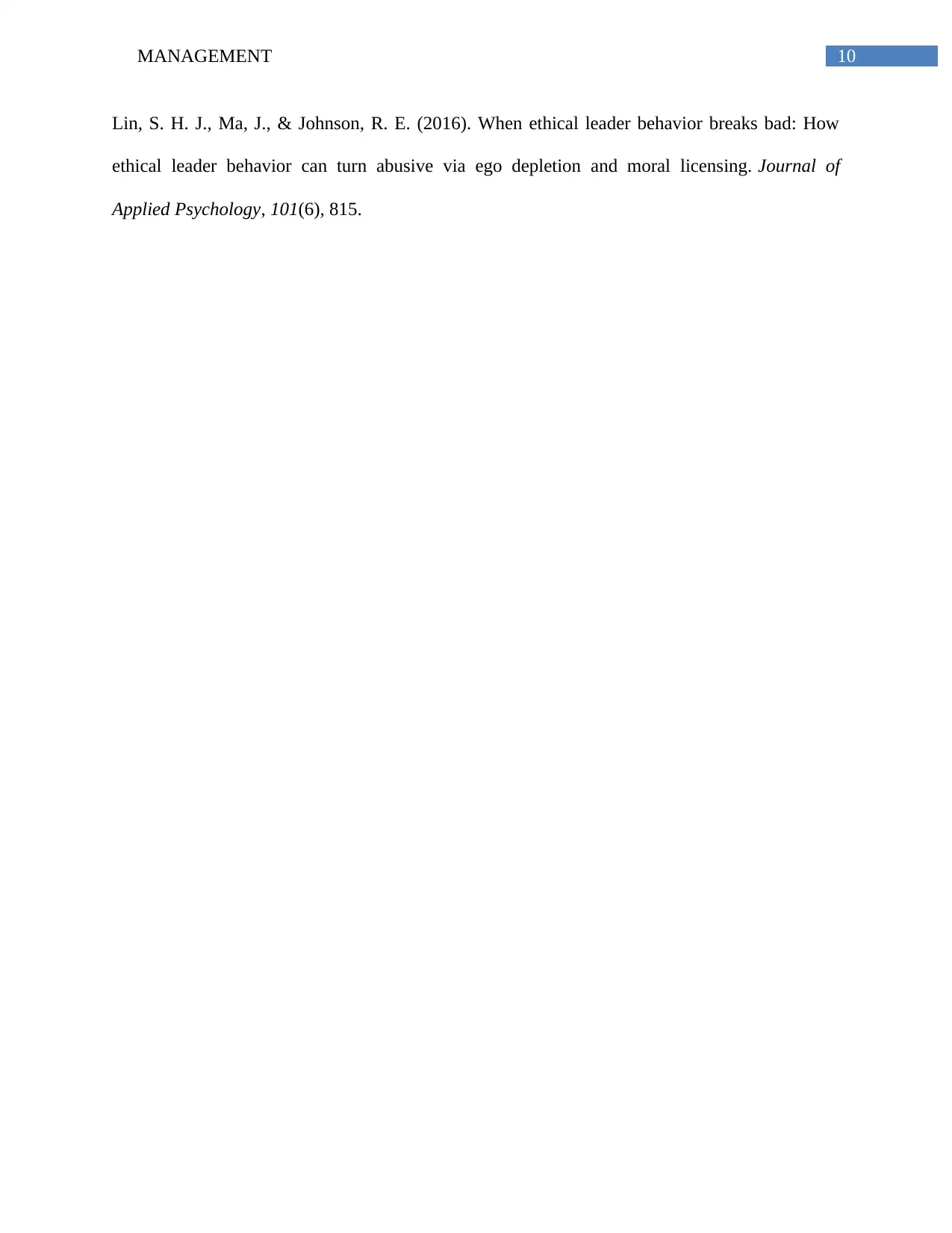
10MANAGEMENT
Lin, S. H. J., Ma, J., & Johnson, R. E. (2016). When ethical leader behavior breaks bad: How
ethical leader behavior can turn abusive via ego depletion and moral licensing. Journal of
Applied Psychology, 101(6), 815.
Lin, S. H. J., Ma, J., & Johnson, R. E. (2016). When ethical leader behavior breaks bad: How
ethical leader behavior can turn abusive via ego depletion and moral licensing. Journal of
Applied Psychology, 101(6), 815.
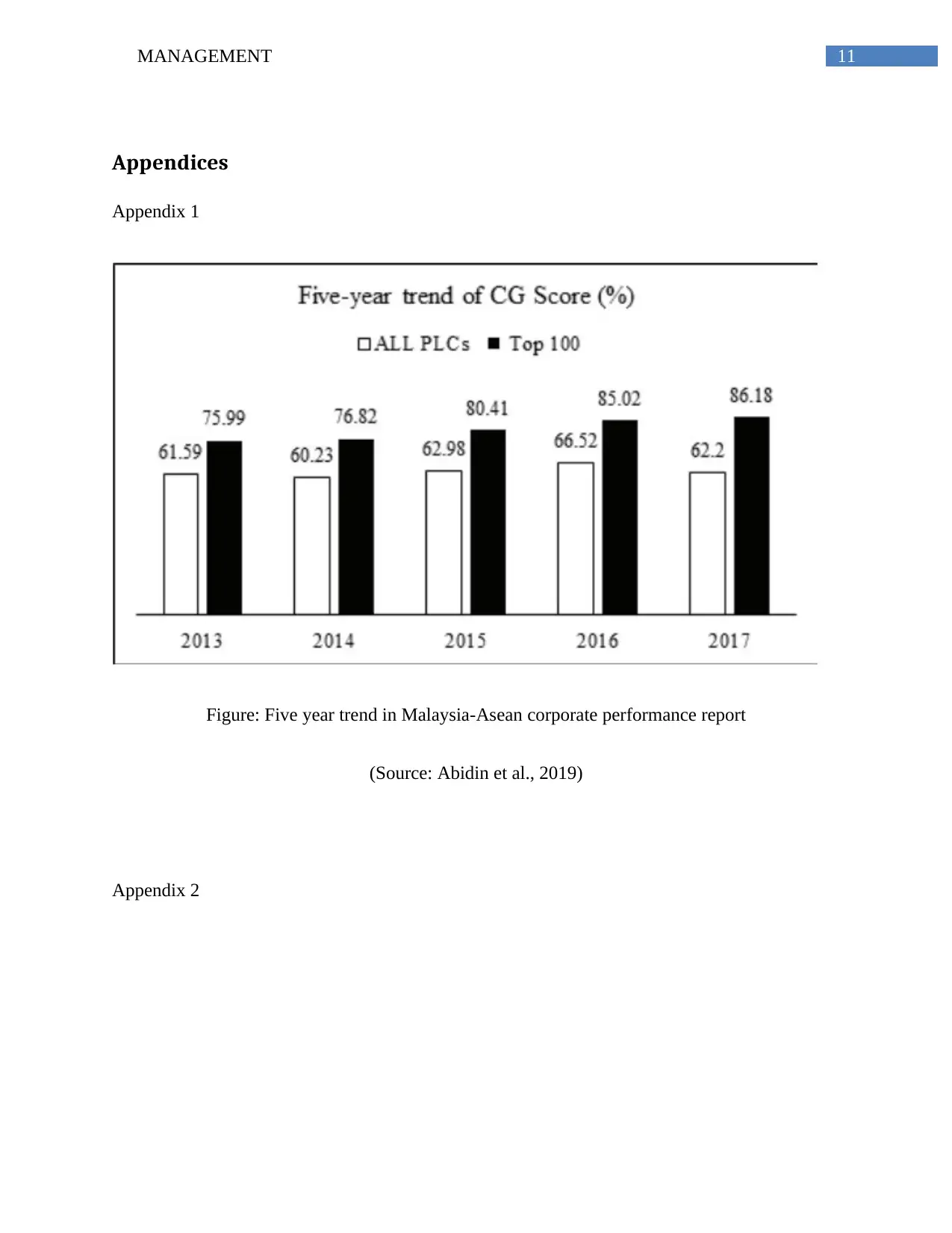
11MANAGEMENT
Appendices
Appendix 1
Figure: Five year trend in Malaysia-Asean corporate performance report
(Source: Abidin et al., 2019)
Appendix 2
Appendices
Appendix 1
Figure: Five year trend in Malaysia-Asean corporate performance report
(Source: Abidin et al., 2019)
Appendix 2
⊘ This is a preview!⊘
Do you want full access?
Subscribe today to unlock all pages.

Trusted by 1+ million students worldwide
1 out of 13
Related Documents
Your All-in-One AI-Powered Toolkit for Academic Success.
+13062052269
info@desklib.com
Available 24*7 on WhatsApp / Email
![[object Object]](/_next/static/media/star-bottom.7253800d.svg)
Unlock your academic potential
Copyright © 2020–2026 A2Z Services. All Rights Reserved. Developed and managed by ZUCOL.





